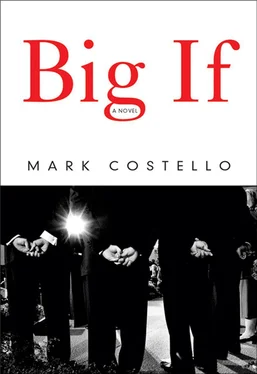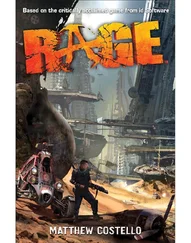Driving up the interstate, chewing her dry aspirin, Peta was talking on the cell phone to her secretary, Claus. Claus was a fine secretary, Prussian and efficient. Noel had met him on a cruise ship to St. Bart’s.
Claus said, “And how is Lauren?”
“She’s impossible,” said Peta. “Get a pen. I need a listings search—”
“Again?”
“Just get a pen. We need Greek Revival, sea views, humidor, gazebo, and a music room, fretted ironwork a definite plus. Also a self-mulching garden.”
“What is a self-mulching garden?”
“I don’t know, just search for it. Any messages?”
Claus read from a pad. “The VP’s campaign called, a rude man named Tim. He wants to confirm you as a volunteer for tomorrow morning.”
“Call him back, confirm it.”
“Agent Ryan called at ten. Is he that new cute boy who works at Impact Realty?”
“No. What did he say?”
“Please call. Want his mobile number?”
“I have it,” Peta said.
“Also Jens. He was at the house, Santasket Road.”
“Why wasn’t he at work?”
“He didn’t say.”
“Is everything all right?”
“He didn’t say it wasn’t.”
“Goddammit, Claus, what did he say?”
“Nothing. He said the place looked fine.”
Nothing and more nothing — this was Jens the last few months. Peta rubbed her temples. She knew that he had fallen behind on his latest project, Monster Todd, and that he left his office for long stretches during the workday. He called her sometimes from the road, either to attack her for coddling the wealthy or to apologize for a past attack, a cycle of attack and regret, itself a form of self-attack, which only led to more attacks on her.
She said, “I’m sorry, Claus — I’m a bit wound up today. Do the listings search. If you find something good, set up a showing ASAP. Let’s find a fucking house for Lauren Czoll.”
She was coming to the beaches exit. The cars were doing seventy, a few feet from each other. A FedEx van was braking in her lane, slowing to a stop. She tried to pull around, but there was a Honda on the driver’s side, braking to a stop. Ahead, she saw cars slowing, brake lights going red, or already stopped, a line of shimmer to the crest of the next hill. She cut into the breakdown lane and tried to nose her way up to the next exit — it was just ahead — but others had the same idea, a blue SUV, a black pickup, two guys on motorcycles, moving till they slowed and finally stopped. She thought about backing up in the breakdown lane to the beaches exit, but even as she put the car in reverse other cars, coming north, filled the lanes behind her, slowing to a stop, and Peta was sealed in, stranded between exits.
She said, “Fuck.” She looked through her bag for Voices of the Rain Forest . She tried to untie the string, finally had to bite it. She called Brian Ryan’s mobile.
“Threats.”
“Agent Ryan? It’s Peta Boyle from Moss Properties in Portsmouth.”
“Ms. Boyle,” Brian Ryan said. “Thanks for calling back.” The voice was smooth and young-official with a western twang. “Any new developments at the Dental Building? It’s just routine. We like to keep abreast.”
“Yes of course,” said Peta, who had grown to loathe and fear this word routine , the way the cops and guards and agents used this word. She told Brian Ryan that there were no new developments, everything was normally abnormal at the Dental, as before.
“There’s something I don’t get,” she said.
Brian Ryan said, “What’s that?”
“I don’t get how my routine relates to your — routine. I don’t get the connection between the Dental and whatever it is you’re looking for.”
“Oh, I doubt there’s a connection,” Brian Ryan said. “We track eighty thousand threats a year from Beltsville, Ms. Boyle. The vast majority are blips and nothing more.”
“Blips?” said Peta. What the hell was he talking about?
“They’re nothing, they lead nowhere, they don’t connect to anything. Still, the only way to know for sure is to act as if they lead somewhere, do your follow-up beforehand. We can’t afford to wait until the ball drops. Are you in Portsmouth now, ma’am?”
“Heading there,” said Peta, still pondering the blips and dropping balls. “I’m stuck in traffic.”
“Me too,” Brian Ryan said. “Traffic’s bad up here. That’s the big surprise. I always thought New Hampshire would be pretty traffic-free.”
“It’s not always bad,” Peta said defensively. She blamed it on the primary, like some kind of bomb test or mass evacuation drill, this staged craziness, three months every leap year.
“What’s your Portsmouth ETA?” he said.
“My ETA,” she said, “is not known at this time. I’m stuck on 95.”
“Me too. Whereabouts are you?”
“Just past the beaches exit.”
“Me too. What cars are you near?”
“FedEx truck, some motorcycles, and an SUV.”
“You must be right around me,” Brian Ryan said.
She saw a young man two cars over, talking on a cell phone. The young man wore a necktie and a white straw cowboy hat. She waved at him.
“I see you in that hat,” she said.
“What hat?” he said.
The man was waving back.
“You must be up ahead somewhere,” said Peta, sinking low behind the wheel.
She promised to call Brian Ryan with any new developments. Including peace, she thought — that would be quite new.
Traffic moved, rolling a few feet. The motorcycles revved, rolling to a stop. In the distance, Peta saw the source of the delay, a bus spun out on the grassy strip between the northbound and the southbound sides. The passengers were gathered by the bus. Trooper cars were pulled up, domers strobing, a harsh flicker in the daylight. The accident was not obstructing traffic and yet the cars slowed as they passed to inspect the crash. The highways were the place of straight ahead, lanes and lines, signs mounted high for visibility so that motorists wouldn’t have to make decisions at the final moment, all together — a place of architected flow, rails and information. Any break in flow, any accident, was doubly engrossing because the eyes were starved for something jarring. The first car slowed out of curiosity. The next car slowed to avoid rear-ending the first car. The next car, recognizing rubbernecking, tarried long enough to see what they were rubbernecking at, saw the bus on the grass and looked for the ambulance, the fire trucks, the bloody body on a gurney, pausing long enough to make the cars behind them pause and start rubbernecking too. By the time the back cars were braking to see, the front cars, which had started it, were gone, flying north through normal traffic. In fact, Peta thought, there couldn’t be a back because even after the wreck was towed away, the cars delayed by cars delayed by rubbernecking cars would pause to view the cause of the delay, and if the cause was gone, the motorists would only look longer, seeing nothing, searching disappointedly. Crashing bore, thought Peta.
Traffic started moving. Space opened between cars.
The phone rang.
Brian Ryan said, “We’re moving!”
Peta said, “I see that, thank you.”
The bus coming up on Peta’s left didn’t look damaged and there was no ambulance, no skid marks on the pavement, no deep ruts in the grass. It was nuts, she thought, a thousand cars delayed by this? It wasn’t even a good bus crash. Where were the EMTs, the flame-retardant foam, the line of snap-light flares?
She could see now that the bus belonged to the senator’s campaign. She paused, taking her turn as lead rubbernecker. As the daughter of Phil Boyle, the mortician-politician, Peta was solid for the party, the Rockingham machine, and the machine was solid for the VP. If she didn’t hate the dashing senator (she didn’t — she disliked him, she mistrusted him, and gave him high negatives whenever she was polled), she hated him a little for causing this delay. She only saw his bus, a knot of campaign workers, and reporters with boom mikes, but she knew that he was in the center, totally at fault. Someone honked at her.
Читать дальше












